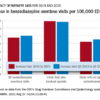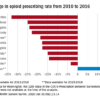SANDESTIN, FLA. – More than ever, clinicians need to rely on a multimodal approach to pain management, Katherine Galluzzi, DO, said at the annual Congress of Clinical Rheumatology.
In the era of opioid addiction – in which she said physicians have sometimes been unfairly vilified – pharmaceutical options are limited not only by the threat of abuse but also by governmental regulation, explained Dr. Galluzzi, chair of geriatrics at the Philadelphia College of Osteopathic Medicine.
The underpinning of pain management in the future will need to be cognitive-behavioral therapy, such as changing behavior and meditation; physical approaches, such as exercise and acupuncture; and interventional treatments, such as nerve blocks and trigger-point injections. Pharmacotherapy can’t do it all, nor should it, she said.
“This is what we have, this is what we need to do,” Dr. Galluzzi said. “This impacts the quality of life, and patients need to begin providing self-care. It’s not going to come in the form of a pill. It has to be a commitment between the patient and the physician.”
The Centers for Medicare & Medicaid Services are proposing a new limit on opioid prescriptions for Medicare recipients – a maximum of 90 morphine mg equivalents per day for no more than 7 days. That will affect older people, who are most likely to be in need of pain management, she said. Those on hospice care and experiencing certain cancer pain will be exempt, she noted in an interview.
Concerns about addiction to drugs such as gabapentin and benzodiazepines might make these therapies less of an option in coming years, Dr. Galluzzi added.
Risk evaluation and mitigation strategy training is an important tool for helping physicians weigh the benefits and the risks of opioid prescriptions. Dr. Galluzzi particularly suggests enrolling in a 3-4 hour, in-person program, saying that it’s well worth the time.
“If you haven’t done a risk assessment and mitigation strategies course and you’re an opioid prescriber,” she said, “I highly recommend that you do that.”
© Frontline Medical Communications 2018-2021. Reprinted with permission, all rights reserved.


